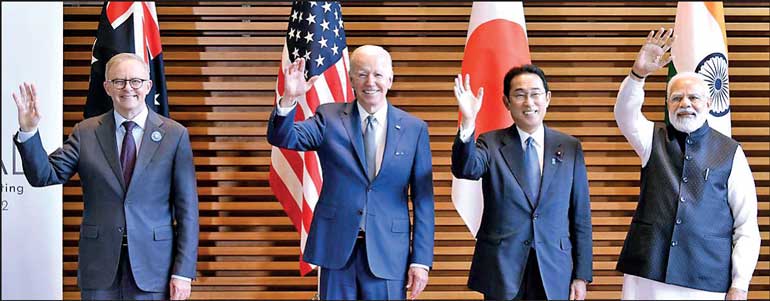Saturday Feb 21, 2026
Saturday Feb 21, 2026
Friday, 20 January 2023 00:00 - - {{hitsCtrl.values.hits}}

By Dhammika Adhikari
Today the Quad partners have become more serious about expanding their security cooperation in the Indo-Pacific. The expanding cooperation is among the countries in Europe such as the United Kingdom and France who are interested in the region. However, there is a danger that Quad as a group could be left behind as these other agreements become more widespread and more in-depth in their focus on security cooperation.
Most recently, Japan and the UK signed a defence agreement that facilitates the deployment of troops in each country. This mutual agreement includes using port facilities, a joint exercise between both militaries, and promoting bilateral security and defence cooperation among both countries.
The Japanese statement in this context needs to be considered more since world peace has been threatened due to the ongoing Russian aggression against Ukraine and the Chinese stance could be changed against the twain and South China Sea. The Japanese government has highlighted the requirement of having a closer relationship between Japan and the United Kingdom ‘with the broader goal of realising a free and open Indo-Pacific’.
British perspective
British Prime Minister Rishi Sunak remarked, “Increasingly competitive world; it is more important to continue to stand shoulder to shoulder as we navigate the unprecedented global challenges of times,” highlighted in the press release. In this backdrop Japan, Italy, and the UK agreed to commence the next generation of air fighter jets under the global combat air power program which was signed in December. Even UK and Japan have agreed to have close relations on bilateral cooperation in cyber resilience, online safety, and semiconductor. Japan has identified its neighbour’s behaviour and reviewed its defence doctrines as per the contemporary environment.
Chinese response to Japan
Chinese foreign ministry has responded to the relationship between Japan and UK noting that this development could exploit this region as “an anchor for peace and development not a wrestling ground for all countries and poses no challenge to anyone” and the Chinese foreign ministry added that it should not target an imaginary enemy emerging in future.
2+2 meeting with the United States of America and Japan
The joint statement between these two countries has highlighted the requirement to have advanced bilateral modernisation initiatives to build more capable, integrated, and agile alliances that bolster deterrence and address evolving regional and security challenges. They also discuss the increase in the capacity of several mission areas, including integrated air and missile defence, anti-surface warfare, anti-submarine warfare, mine warfare, amphibious and airborne operations, intelligence and surveillance reconnaissance and targeting, logistics, and mobility. In addition, Japan will build up its counter-strike capability with the help of the United States of America.
Further, they have discussed the emerging and critical technologies, space, and information security found mentioned in the statement with a goal “to strengthen mission assurance, interoperability and operational cooperation including through enhanced collaboration of state domain awareness.” Further, both ministers ensured the commitment to oppose any unilateral change to the status quo by force regardless of the location in the world.
Japan and Australian relationship
Japan and Australia are members of the Quad and signed a similar agreement to the UK with Australia on 6 January 2022 that facilitates reciprocal access and cooperation between the militaries of the two countries. During the signing ceremony, the former Australian Prime Minister Scott Morrison highlighted Japan as “our closest partner in Asia as demonstrated by our special strategic partnership.” Australia’s only such partnership is an equal partnership of shared trust between two great democracies committed to the rule of law, human rights, free and open Indo-Pacific. Further, Japan and Australia’s agreement covers the areas of military intelligence and space and cyber security cooperation. The US treaty among Australia, the UK, and the US is another important new security agreement in the Indo-Pacific involving two Quad partners. This is important to Australia since it is waiting to acquire nuclear-powered submarines.
India also deepened the military agreement in the region to support the Indian navy with countries such as Australia, Japan, the United States, Singapore and South Korea, which helps to enhance the military cooperation in other regions too.
(The writer has a Bachelor’s and Master’s in Security and Strategic Studies from the General Sir John Kotelawala Defense University and experience in discussing and disseminating knowledge in various levels of forums for over 10 years.)